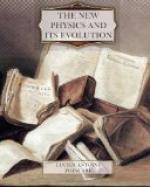Mr Willoughby S. Smith and Mr Charles A. Stevenson also undertook experiments during the last twenty years, in which they used induction, but the most remarkable attempts are perhaps those of Professor Emile Rathenau. With the assistance of Professor Rubens and of Herr W. Rathenau, this physicist effected, at the request of the German Ministry of Marine, a series of researches which enabled him, by means of a compound system of conduction and induction by alternating currents, to obtain clear and regular communications at a distance of four kilometres. Among the precursors also should be mentioned Graham Bell; the inventor of the telephone thought of employing his admirable apparatus as a receiver of induction phenomena transmitted from a distance; Edison, Herr Sacher of Vienna, M. Henry Dufour of Lausanne, and Professor Trowbridge of Boston, also made interesting attempts in the same direction.
In all these experiments occurs the idea of employing an oscillating current. Moreover, it was known for a long time—since, in 1842, the great American physicist Henry proved that the discharges from a Leyden jar in the attic of his house caused sparks in a metallic circuit on the ground floor—that a flux which varies rapidly and periodically is much more efficacious than a simple flux, which latter can only produce at a distance a phenomenon of slight intensity. This idea of the oscillating current was closely akin to that which was at last to lead to an entirely satisfactory solution: that is, to a solution which is founded on the properties of electric waves.
Sec. 5
Having thus got to the threshold of the definitive edifice, the historian, who has conducted his readers over the two parallel routes which have just been marked out, will be brought to ask himself whether he has been a sufficiently faithful guide and has not omitted to draw attention to all essential points in the regions passed through.
Ought we not to place by the side, or perhaps in front, of the authors who have devised the practical appliances, those scholars who have constructed the theories and realised the laboratory experiments of which, after all, the apparatus are only the immediate applications? If we speak of the propagation of a current in a material medium, can one forget the names of Fourier and of Ohm, who established by theoretical considerations the laws which preside over this propagation? When one looks at the phenomena of induction, would it not be just to remember that Arago foresaw them, and that Michael Faraday discovered them? It would be a delicate, and also a rather puerile task, to class men of genius in order of merit. The merit of an inventor like Edison and that of a theorist like Clerk Maxwell have no common measure, and mankind is indebted for its great progress to the one as much as to the other.




